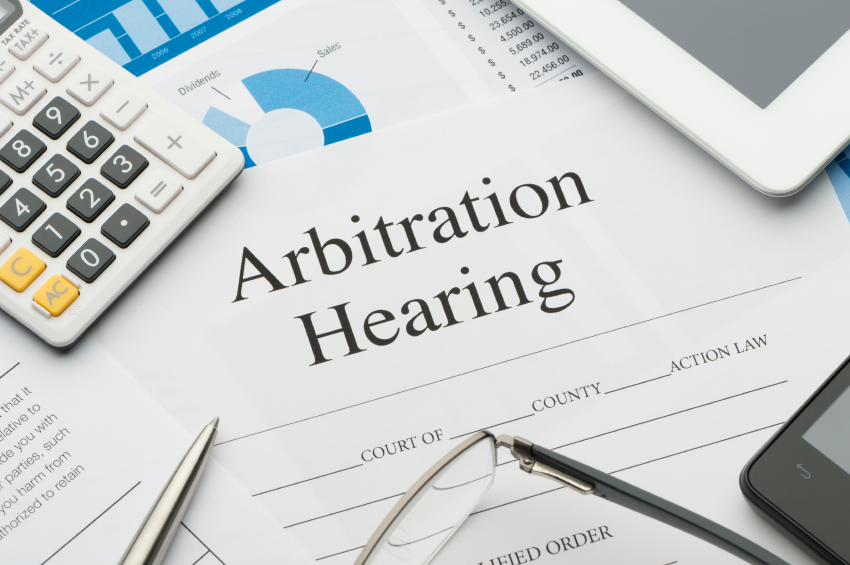Construction Arbitration Solicitors
 Although Arbitration has fallen from favour in recent years in the UK for construction contract disputes due to the preference for adjudication, it is still a valid form of resolving conflicts in a non-litigious manner, and is especially favoured as a disputes resolution method for determining complex cases crossing multiple international jurisdictions.
Although Arbitration has fallen from favour in recent years in the UK for construction contract disputes due to the preference for adjudication, it is still a valid form of resolving conflicts in a non-litigious manner, and is especially favoured as a disputes resolution method for determining complex cases crossing multiple international jurisdictions.
The Definition of Arbitration
Arbitration is the settling of a dispute between two parties by a neutral third party, known as an Arbitrator. As well as resolving construction disputes, Arbitration is used in many other areas which can lead to disagreements including; employment, maritime and financial services.
Specialists In Our Field Let Us Guide You
For Arbitration to occur, both parties to the dispute must agree to arbitrate. There is usually a clause in construction contracts allowing for Arbitration proceedings to be launched if a dispute arises, but parties can agree to Arbitration even if such a clause does not exist. When relevant the process is aligned with the CIMA Construction Industry Model Arbitration Rules.
The Arbitrator will listen to both sides of the dispute, and consider any evidence such as witness opinions, documents and expert opinions. Once the Arbitrator reaches his decision, he or she publishes it as an award, which is binding on both parties.
For more information on how Fisher Scoggins Waters can help with the Arbitration process, contact us by telephone on 0207 993 6960 or email Charlotte Waters:
The Advantages of Arbitration over Litigation in Construction Contract Disputes
-
The proceedings are private, thereby protecting each party’s commercial reputation
-
The parties to the dispute have the power to choose the Arbitrator (for example, for his or her engineering or commercial knowledge)
-
Proceedings are less formal than Court proceedings, (the Arbitration can be held in a hotel conference room for example)
-
Decisions are binding, and the Courts will enforce them
-
Arbitration has generally been seen as more cost-effective than litigation; however, this becoming less and less the case
The Disadvantages of the Arbitration Process
-
An Arbitration has many similarities to litigation, and, therefore, can end up costly and time-consuming
-
Rights to appeal are limited
-
Both parties must pay the Arbitrator’s costs
A Brief Guide to the Arbitration Process
Under the Arbitration Act 1996, the following procedure should be followed when commencing Arbitration:
-
Before commencing Arbitration, the parties must refer the construction contract and check as to whether or not alternative forms of dispute resolutions need to be tried beforehand. If there is an agreed tiered process of dispute resolution set out in the contract, the Courts have shown that they will try to uphold the clause (Channel Tunnel, Mackley v Gosport, Cable & Wireless, Cott v FE Barber, Holloway v Chancery Mead).
-
Applicants also need to check any time restrictions under the construction contract or the Limitations Act 1980.
-
Arbitration commences under the Act with the service of a Notice requiring Arbitration which essentially requires the other party to comply with their obligations under the Arbitration Agreement. The notice must clearly identify the dispute which is being sent to Arbitration.
-
The Respondent, on having received the Notice of Arbitration, must participate in the appointment of an Arbitrator.
Using Arbitration to Resolve International Construction Contract Disputes
There are a number of reasons why international Arbitration is the preferred method of solving disputes, where one party to the disagreement is based in the UK and the other in an overseas jurisdiction. These include:
-
The fact that the parties to the dispute are free to chose an Arbitrator, who has expertise and experience in the area surrounding the conflict.
-
The neutrality of the Arbitration process, which is especially attractive if one party to the dispute has very little knowledge of the legal and court process in the nation where the other party resides.
-
Arbitration awards can be enforced in other jurisdictions that are signatories to the 1958 Convention on the Recognition and Enforcement of Foreign Arbitral Awards (commonly known as the New York Convention). There are currently 150 countries which have signed the Convention. Court judgments cannot be enforced in this way and with such ease in foreign jurisdictions.
According to a 2010 survey by Queen Mary University, London is the most popular Arbitration seat for corporations. The popularity of London is due to its reputation as a neutral and impartial jurisdiction, the prevalence of English law as the governing law of the contract and the large pool of specialist solicitors, barristers and arbitrators available.
For more information on how Fisher Scoggins Waters can help with the Arbitration process, contact us by telephone on 0207 993 6960 or email Charlotte Waters: